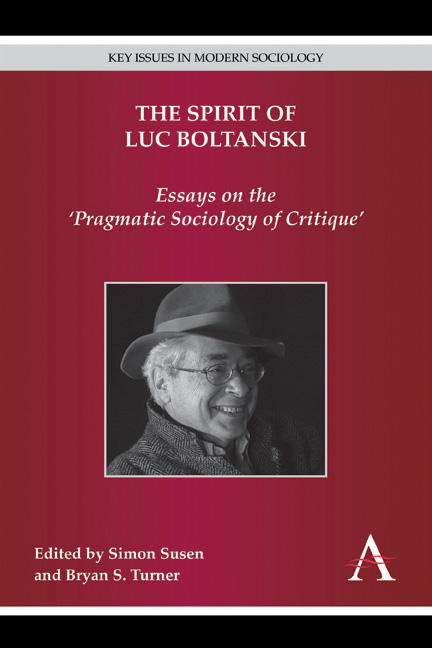Book contents
- Frontmatter
- CONTENTS
- List of Contributors
- Preface
- Part I Introductory Remarks
- Part II Luc Boltanski and (Post-) Classical Sociology
- 1 Figures of Descent from Classical Sociological Theory: Luc Boltanski
- Part III Luc Boltanski and Pragmatism
- Part IV Luc Boltanski and Critique
- Part V Luc Boltanski and Critical Sociology
- Part VI Luc Boltanski and Political Sociology
- Part VII Luc Boltanski and Contemporary Issues
- Part VIII Luc Boltanski in Conversation
- Part IX Luc Boltanski and His Critics
- Index of Names
- Index of Subjects
1 - Figures of Descent from Classical Sociological Theory: Luc Boltanski
from Part II - Luc Boltanski and (Post-) Classical Sociology
Published online by Cambridge University Press: 05 December 2014
- Frontmatter
- CONTENTS
- List of Contributors
- Preface
- Part I Introductory Remarks
- Part II Luc Boltanski and (Post-) Classical Sociology
- 1 Figures of Descent from Classical Sociological Theory: Luc Boltanski
- Part III Luc Boltanski and Pragmatism
- Part IV Luc Boltanski and Critique
- Part V Luc Boltanski and Critical Sociology
- Part VI Luc Boltanski and Political Sociology
- Part VII Luc Boltanski and Contemporary Issues
- Part VIII Luc Boltanski in Conversation
- Part IX Luc Boltanski and His Critics
- Index of Names
- Index of Subjects
Summary
Luc Boltanski, whose work is reaching a crescendo, has made an enduring contribution to sociology. His distinction lies chiefly in his inventive crossing of the approach to domination in the Marxist and Weberian traditions with the interest in moral and symbolic representations of the Durkheimian tradition. Yet, it also bears all the fascination of his early alliance with his master, Bourdieu, and his subsequent public break from him. In particular, we see the mature Boltanski wrestling productively with a fruitful conceptual framework for understanding the contemporary mode of production, and the reappearance within it of mass precariousness in relation to work. Within this framework, perhaps the main virtue of Boltanski's sociology has been to enrich our understanding of subjective meanings at moments of indeterminacy. Thus, he puts under his microscope the rationales for subaltern actors' private and sometimes secret actions, such as abortion (e.g. 2004), as well as the evolving ideological legitimation selected by the dominant class (e.g. with Ève Chiapello, 2005 [1999]) and the justifications for oppositional moments of mass resistance (2011 [2009]).
There are three phases to Boltanski's writing. In his initial period, in which he sometimes co-authored articles with Bourdieu, even his independent publications possess close affinities with the latter's constructivist realism (see, for instance, 1987). Yet, already at this stage, he shows signs of being a critical advocate of Bourdieusian theory, disagreeing occasionally on less important matters. In his middle period (1990s), Boltanski offers insights into different social universes (cités) or justifications, but now within a wider framework of a de facto relativist perspectivism (2006 [1991]; 2012a [1990]; 1999 [1993]). His last period elaborates an original critical theory and firmly eschews a normative relativism, combining sociological enquiry with political or ethical reflections.
Certain modes of analysis are constant throughout these three phases. These include, notably, his dissection of the ideology and doxa shared by avant-garde neo-liberal policymakers. This long-standing research underpins his early work (2008 [1976]), the mid-career On Justification (2006 [1991]: 313), and his later magisterial reading of managerial texts, with Chiapello, in The New Spirit of Capitalism (2005 [1999]; see also 2008: 197–208).
- Type
- Chapter
- Information
- The Spirit of Luc BoltanskiEssays on the 'Pragmatic Sociology of Critique', pp. 67 - 88Publisher: Anthem PressPrint publication year: 2014

